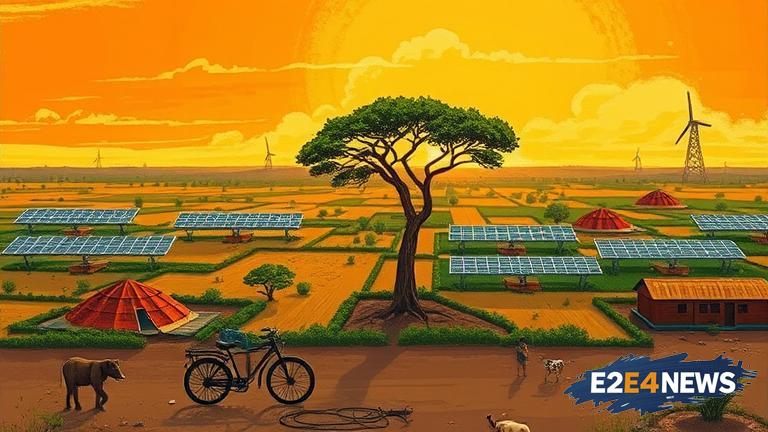The African continent is witnessing a significant shift towards renewable energy, driven by the need to address the pressing issues of energy access, climate change, and sustainable development. With many countries still struggling to provide reliable and affordable electricity to their citizens, renewable energy has emerged as a viable solution. Solar and wind power are becoming increasingly popular, with countries like South Africa, Egypt, and Morocco leading the way. The cost of renewable energy technologies has decreased dramatically over the years, making them more competitive with fossil fuels. This has led to a surge in investment in the sector, with many international companies and organizations committing to support Africa’s renewable energy ambitions. The African Union’s Agenda 2063 has set a target of ensuring access to clean and affordable energy for all Africans by 2030. To achieve this goal, the continent will need to increase its renewable energy capacity significantly. Several countries have already made significant progress in this regard, with Kenya, for example, aiming to generate 70% of its electricity from renewable sources by 2030. Rwanda has also set an ambitious target of becoming a carbon-neutral economy by 2050. The use of renewable energy is not only good for the environment, but it also has the potential to create jobs and stimulate local economies. In fact, a study by the International Renewable Energy Agency (IRENA) found that the renewable energy sector could support up to 24 million jobs globally by 2030. Africa’s renewable energy revolution is also being driven by innovation and technology. For instance, the use of mini-grids and off-grid solar systems is becoming increasingly popular, particularly in rural areas where access to electricity is limited. Additionally, the development of energy storage technologies is helping to address the intermittency of renewable energy sources. The African Continental Free Trade Area (AfCFTA) is also expected to play a crucial role in promoting the development of renewable energy on the continent. By creating a single, unified market, AfCFTA will make it easier for countries to trade in renewable energy technologies and services. Furthermore, the agreement will help to attract investment and promote economic integration. Despite the many opportunities and benefits of renewable energy, there are still several challenges that need to be addressed. These include the lack of infrastructure, limited access to financing, and the need for greater policy and regulatory support. To overcome these challenges, African countries will need to work together and with international partners to develop and implement effective policies and strategies. The private sector will also need to play a key role in driving investment and innovation in the renewable energy sector. In conclusion, Africa’s renewable energy revolution is gaining momentum, driven by the need to address the pressing issues of energy access, climate change, and sustainable development. With the right policies, investments, and innovations, the continent can unlock its vast renewable energy potential and create a more sustainable and prosperous future for all. The use of renewable energy is not only a moral imperative, but it is also an economic and social one. As the world continues to grapple with the challenges of climate change, Africa’s renewable energy revolution offers a beacon of hope and a model for other regions to follow. The continent’s progress in this regard is a testament to the power of innovation, collaboration, and determination. As we look to the future, it is clear that renewable energy will play an increasingly important role in shaping Africa’s development trajectory. With its vast natural resources, innovative spirit, and growing economies, Africa is poised to become a global leader in the renewable energy sector.
